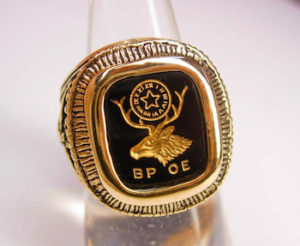
On this date, in 1868, the Black Elks were formed. This historically Black non-profit charitable, fraternal organization is still operating.
It was formally called the Improved Benevolent and Protective Order of Elks and was founded in Cincinnati, OH. During the 19th and first half of the 20th century, African Americans were denied entry into any of the White fraternal organizations. There was a distinct need and desire for these organizations in Black communities because they were wanted everywhere. They provided financial, spiritual, and emotional support and served their communities in many other ways.
For Blacks, these organizations also provided a boost in self-esteem. The first African American societies were formed before the American Civil War, providing one of the few routes for Blacks to economic and personal advancement. The Black Elks became the world's most prominent African American fraternal organization. The IBPOEW was modeled after the BPOE. Its stated purpose is "that the welfare and happiness of its members be promoted and enhanced, that nobleness of soul and goodness of heart be cultivated, that the principles of charity, justice, brotherly & sisterly love, and fidelity be inculcated, that its members and their families be assisted and protected, and that the spirit of patriotism is enlivened and exalted."
B. F. Howard and Pullman Porter Arthur J. Riggs, who had both been denied membership in the all-White BPOE, created the organization. They were determined to form an organization that granted membership to all qualified individuals without regard to race, creed, or ethnicity. Riggs obtained a copy of the BPOE ritual and applied for and was granted copyright for the Black Elks. On November 17, 1898, the first meeting of the Black Elks was held. They tried intimidation when the BPOE could not challenge them on legal grounds. White Elks in Birmingham, AL, pulled Riggs from where he worked and threatened to lynch him unless he relinquished the charter on his next trip to Birmingham.
Riggs agreed but never returned to Birmingham. The White Elks forced Riggs out of his job, and he could not find work anywhere in Cincinnati, so in 1899, under an assumed name, he and his family moved to Springfield, OH. B. F. Howard took over the running of the organization after Riggs went into hiding. With the help of another Black fraternity, the Knights of Pythias, the first chapter of the Black Elks was instituted in Cincinnati in 1899, with the full title of Improved Benevolent Protective Order of Elks of the World (IBPOEW).
The resentment among members of the white Elks continued. In 1906, sensing an opportunity to improve relations with the BPOE, the IBPOEW Grand Exalted Ruler Armand W. Scott ordered Black Elks to wear an IBPOEW pin, not the BPOE pin. This slight difference was enough, and in 1918, the BPOE officially ended its opposition to the IBPOEW. The period of inter-fraternal strife was rendered closed.
Since then, the IBPOEW and its women's organization, the Daughters of the IBPOEW, have continued to work for the African American community. With subdivisions in education, health, veteran's affairs, and civil liberties, the IBPOEW works for the concerns of African Americans and Black Elks worldwide. The lodge shouldered additional duties as the Highland-Ridge neighborhood in Birmingham slid into decline. Times have been challenging for the Black Elks in recent years. Paul Brice, an exalted ruler, says his lodge hopes to revitalize itself, now down to about 50 members. Some lodges have a difficult time paying monthly bills. IBPOEW was an international organization with chapters in Canada for African Canadians that were significant in the Windsor, Toronto corridor until the 1990s.
Years ago, the IBPOEW lodge played a central role in a closed, tightly knit community. As times changed, the lodge's importance waned. Sadly, some Elks and auxiliary members say some young people aren't fit for their groups, and others say drug use is unacceptable.
Black First:
2,000 years of extraordinary achievement
by Jessie Carney Smith
Copyright 1994 Visible Ink Press, Detroit, MI
ISBN 0-8103-9490-1
Rosemary Sadlier, O.Ont., President
Ontario Black History Society